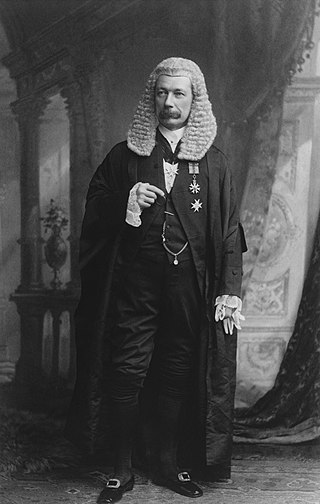
The Law Society of England and Wales is the professional association that represents solicitors for the jurisdiction of England and Wales. It provides services and support to practising and training solicitors, as well as serving as a sounding board for law reform. Members of the Society are often consulted when important issues are being debated in Parliament or by the executive. The Society was formed in 1825.

John Canfield Spencer was an American lawyer, politician, judge and United States Cabinet secretary in the administration of President John Tyler.

His Majesty's Advocate, known as the Lord Advocate, is the principal legal adviser of both the Scottish Government and the Crown in Scotland for civil and criminal matters that fall within the devolved powers of the Scottish Parliament. The Lord Advocate provides legal advice to the government on its responsibilities, policies, legislation and advising on the legal implications of any proposals brought forward by the government. The Lord Advocate is responsible for all legal advice which is given to the Scottish Government.

His Majesty's Solicitor General for England and Wales, known informally as the Solicitor General, is one of the law officers of the Crown in the government of the United Kingdom. They are the deputy of the Attorney General, whose duty is to advise the Crown and Cabinet on the law. They exercise the powers of the Attorney General which are delegated to them under section 1 of the Law Officers Act 1997. Despite the title, the position is usually held by a barrister as opposed to a solicitor.

His Majesty's Solicitor General for Scotland is one of the Law Officers of the Crown, and the deputy of the Lord Advocate, whose duty is to advise the Scottish Government on Scots Law. They are also responsible for the Crown Office and Procurator Fiscal Service which together constitute the Criminal Prosecution Service in Scotland.

Sir William Webb Follett, QC was an English lawyer and politician who served as MP for Exeter (1835–1845). He served twice as Solicitor-General, in 1834-5 and 1841 and as Attorney-General in 1844. He was knighted in 1835. He was reputed to have been the "greatest advocate of the century".

The Solicitor-General for Ireland was the holder of an Irish and then United Kingdom government office. The holder was a deputy to the Attorney-General for Ireland, and advised the Crown on Irish legal matters. On rare occasions, there was also a Deputy Attorney-General, who was distinct from the Solicitor-General. At least two holders of the office, Patrick Barnewall (1534–1550) and Sir Roger Wilbraham (1586–1603), played a leading role in Government, although in Barnewall's case, this may be partly because he, was also King's Serjeant. As with the Solicitor General for England and Wales, the Solicitor-General for Ireland was usually a barrister rather than a solicitor.

The Short Titles Act 1896 is an act of the Parliament of the United Kingdom. It replaces the Short Titles Act 1892.

The Nautical Magazine was a monthly magazine containing articles of general interest to seafarers. The magazine was first published in 1832 by Simpkin, Marshall, and Co. (London) as The Nautical Magazine: A Journal of Papers on Subjects Connected with Maritime Affairs in General and then as The Nautical Magazine And Naval Chronicle. From 1891 the title was modified to Nautical Magazine and Journal of the Royal Naval Reserve and it was published by Brown, Son and Ferguson, (Glasgow), who continued to produce it until it was acquired and merged into Sea Breezes in 2011.
The Attorney-General of Barbados is the primary legal advisor to the Government of Barbados.

Sir John Worrell Carrington, was a British jurist, elected representative, and colonial administrator between 1872 and 1902. He served the Caribbean colonies of Barbados, St. Lucia, Tobago, Grenada, and British Guiana until his final appointment as Chief Justice of Hong Kong.

According to the Constitution of Trinidad and Tobago, the supreme law of the nation, the attorney general and minister of legal affairs of Trinidad and Tobago is the primary legal advisor to the Government of Trinidad and Tobago.
The chief justice of Barbados is the head of the Supreme Court of Barbados as defined by the constitution.









